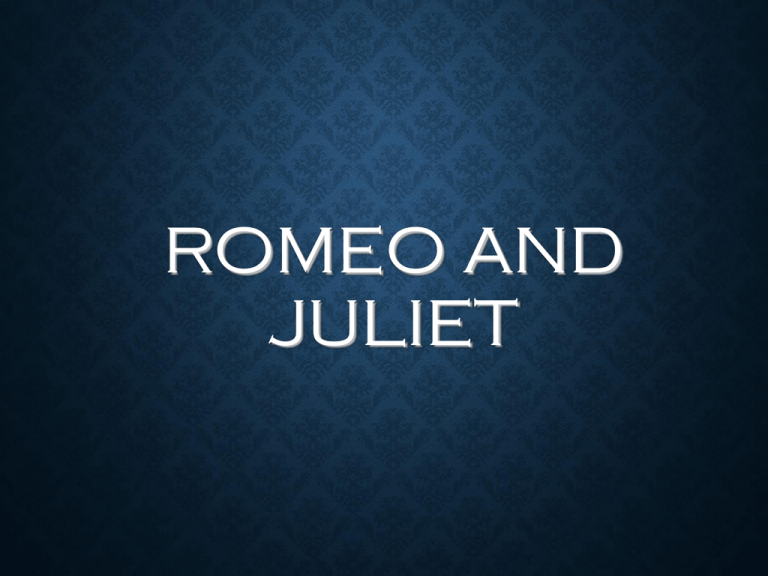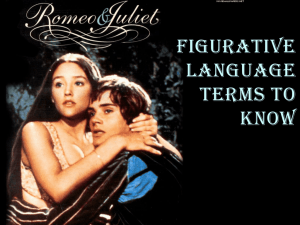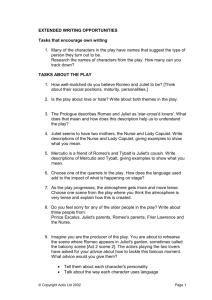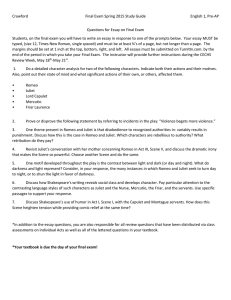File
advertisement

ROMEO AND JULIET Drama Definition: a story with action and dialogue for stage performance – we are usually reading the script 2 basic stage structures 1. “picture-frame stage” – audience watches a fictional world through a window Audience is “spying” Characters are expected to act as ordinary people 2. “platform stage” – * Stage extends into audience with tiers at the rear of the stage for additional acting areas Line between spectator & actor was blurred Aside – actor speaking his thoughts directly to the audience Soliloquy – actor speaking his thoughts aloud; usually a paragraph in length Drama Necessary Terms for the stage 1. Comedy – a drama that ends happily 2. Tragedy – a drama that ends unhappily 3. History – drama of the life of famous people 4. Act – major divisions of a play; usually a scene change 5. Scene – division within acts ; setting is consistent & time continues uninterrupted Romeo and Juliet Basis for play – “Pyramis & Thisbe;” although the idea of tragic young love exists in all folklore Using well-known legends/myths was common – could explain Shakespeare’s wide-ranging knowledge Theme Using wise judgment when making life choices is necessary. We will view the theme through a series of contrasts 1.Infatuation vs. genuine, mature love 2.Youthful haste vs. Mature Wisdom 3.Passion vs. Reason 4.Fate vs. Free Will – Elizabethans argued over the idea of whether or not man was a product of fate (we can’t control what happens to us) or if man had a free will to choose his own destiny The themes are revealed through 1)Character Development – reveals Shakespeare’s tone (attitude) towards characters 2)Imagery Imagery Time – pay close attention to all the different references to time passing, standing still, moving too quickly; things that symbolize time passing Light and Darkness Act I Scene I SERVANTS RELATIVES/ FRIENDS ROMEO’S FRIENDS • Mercutio (mercurial)- volatile, fleshly, emotional • Benvolio (benevolent)- rational, honest and reliable Discussion questions • What significant information is revealed about Capulet in the opening of Act I, Scene ii? • How old is Juliet? How does knowing her age affect your understanding of the theme and development of the play? • What contrasts are apparent between Juliet and the other women in this scene? Why does Shakespeare draw a distinction among them? • What extended metaphor is present in Act I, Scene iii? JULIET BACKGROUND • Possibly named after the month of July • Born near Lammastide (Aug. 1) • Age: 14 JULIET’S RELATIONSHIPS • Father: very close • Mother: fairly close • Suitors: not interested LADY CAPULET • Age: around 26-30 • Perspective on love: • Physical Attraction • Self-Advancement ROMEO’S FRIENDS • Mercutio (mercurial)- volatile, fleshly, emotional • Benvolio (benevolent)- rational, honest and reliable IMPORTANT QUOTES • Some consequence yet hanging in the stars/shall bitterly begin his fearful date/with this night’s revels, and expire the term/of a despised life clos’d in my breast/by some vile forfeit of untimely death (Act I, Scene IV). • Fate vs. Free Will Romeo & Juliet Meet •Romeo begins with a great pick-up line He holds her hand and then says he will pay the fine of a kiss if he has profaned her hand. •Important Quote Romeo: "Is she a Capulet? / O dear account! My life is my foe's debt. I.v. line 113-114 Juliet: "My only love sprung from my only hate!" I. v. line 134 17 Which character(s) do you find sympathetic? Why? Act II Prologue - ideas of passion leading to the desire for time to hurry Scene i – Foil: contrasting character Benvolio - not overly talkative Mercutio – unpredictable 18 Scene ii - After the party Romeo describes Juliet in terms of light; and both desire darkness to hide them from Juliet's family Fate vs. Free Will Youthful Haste exhibited 19 What is their plan? Important Quotes Romeo "But soft, what light through yonder window breaks? / It is the east, and Juliet is the sun." II. ii. lines 3-4 Juliet "What's in a name? That which we call a rose / By any other name would smell as sweet." II. ii. lines 43-44 "Good night, good night! Parting is such sweet sorrow, / That I shall say good night till it be morrow." II. ii. lines 183-184 20 Act II, Scene III Themes • Passion vs. Reason • Youthful Haste vs. Mature Wisdom • Infatuation vs. Genuine, Mature Love The Verona Gazette You are a reporter, writing a social column for one of Verona’s local gossip magazines. Your job is to record what is happening with the Montagues and Capulets and any news that you may have picked up. You can write about the ball or some other recent event. Feel free to describe fictional characters, as well as real ones. • Word Count: 200 words minimum • You may use first-person • Must be typed • Must include details and references to real events from Act 1-Act 2, Scene 3 • Due Wednesday Act II, Scene V Themes • Youthful Haste vs. Mature Wisdom • Infatuation vs. Genuine, Mature Love Act II, Scene VI IMPORTANT QUOTES • Some consequence yet hanging in the stars/shall bitterly begin his fearful date/with this night’s revels, and expire the term/of a despised life clos’d in my breast/by some vile forfeit of untimely death (Act I, Scene IV). • Fate vs. Free Will Romeo & Juliet Meet •Romeo begins with a great pick-up line He holds her hand and then says he will pay the fine of a kiss if he has profaned her hand. •Important Quote Romeo: "Is she a Capulet? / O dear account! My life is my foe's debt. I.v. line 113-114 Juliet: "My only love sprung from my only hate!" I. v. line 134 Which character(s) do you find sympathetic? Why? 28 Act III, scene ii 29 Juliet's conflict: passion vs. reason l. 60-69 - oxymoron - brief phrases that combine contradictory elements for effect Honors: l. 90-91 - chiasmus - parallel phrase, clauses, or sentences in which the 2nd reverses the elements of the first, inverting the parallel structure 30 Act III, scene iv 31 Capulet changes his mind several times in this scene. 1. Doesn't want to talk about marriage tonight. -then decides to send Lady Capulet to Juliet tonight. 2. Decides Juliet & Paris will marry on Wednesday - then decides that is too early so moves it to Thursday 3. Will only invite 1 or 2 people -then decides on half a dozen 32 Act III, scene v 33 Why are Romeo and Juliet arguing about the type of bird? l. 72-73 -- Elizabethan's believed that grief should not be excessive Juliet uses words with double meanings to argue with her mother Compare Lady C's, Capulet's and Juliet's reactions 34 Explain the metaphor in l. 128-138 What evil advice does the nurse give Juliet? How does Juliet react? From what source does Juliet decide to seek further advice? What desperate course of action does she consider in the last 2 lines - couplet? 35 Act IV, Scene I 36 Themes • Youthful Haste vs. Mature Wisdom • Fate vs. Free Will Friar’s Plan for Juliet • • • • Meet with parents and agree to marry Paris Drink the potion that makes her appear dead Lie in the family crypt Romeo (notified by letters) will come rescue Juliet with the Friar and take her to Mantua Act IV, Scene III 39 Soliloquy Hypothetical “what if” scenarios: • The poison doesn’t work and she will still marry Paris in the morning • The friar has secretly plotted to poison her to cover his tracks • She wakes before Romeo arrives and suffocates • She is haunted by Tybalt’s ghost • She goes insane and kills herself Act IV, Scene V 42 Famous quote “Death lies on her like an untimely flower” Paradox- “Not life, but love in death” Themes: Fate vs. Free Will Reference to time Anaphora- “Our instruments to melancholy bells…” “Dear Juliet” Letter You are the friend of Romeo or Juliet. One of these characters has come to you, asking for your advice on his/her love life. What kind of wisdom can you give to this character? Try to offer sensible, mature counsel to Romeo or Juliet. • You need to include at least two quotes from the text that show Romeo/Juliet’s feelings toward this situation. • You may assign yourself a fictional identity • Must be typed, in the format of a letter • Due Friday Act IV, Scene III 46 Timeline 1. Start recording all the major events from Romeo and Juliet. Break up the events into days. Day 1: Romeo is lovesick over Rosaline and… etc. 2. Create a linear timeline, showing the days and corresponding events





